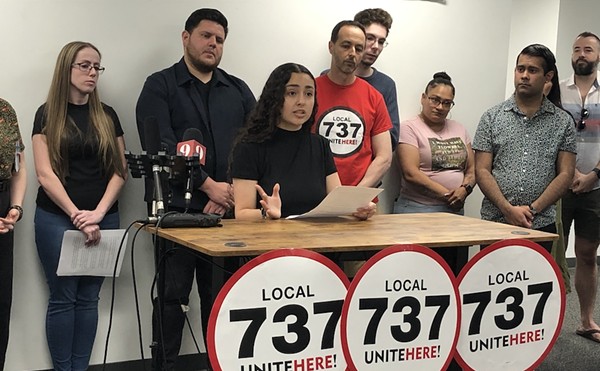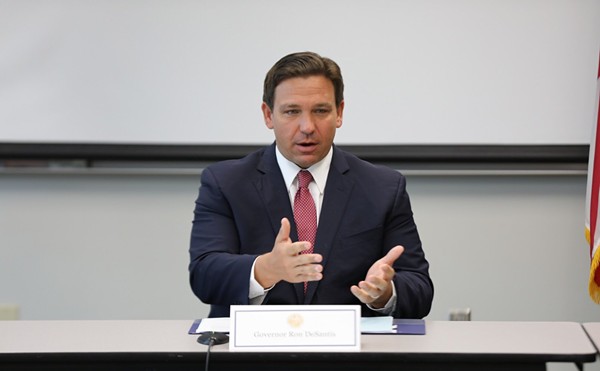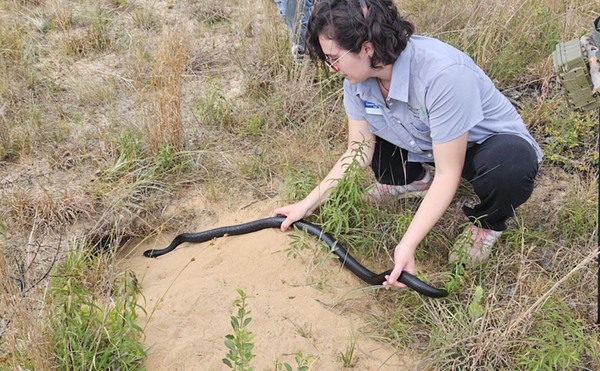Two years ago K.B. Forbes, founder of an advocacy group for the uninsured called Consejo de Latinos Unidos, traveled from his California home to Orlando, where he set about shaming the area's two biggest health care facilities: Florida Hospital and Orlando Regional Medical Center. His charge? That the hospitals charged uninsured patients much more money for the same services than they charged patients with insurance. Essentially, Forbes argued, they'd set up a two-tiered system that stuck it to the people who could least afford it.
As examples he offered the story of a patient with a kidney infection who was charged $23,159 for what an insurance company would have paid only $2,904, an 800 percent markup. Another woman was billed $11,341 for a four-day hospital stay that would have cost an insurance company $3,841.
After Forbes bought TV and radio ads in Orlando labeling these practices "price gouging," Consejo received hundreds of calls from local uninsured patients. The campaign got some coverage by local media, but the hospitals never changed their policies. So recently, some uninsured patients whom Consejo put in contact with Miami civil-rights lawyer Matthew Dietz have filed suits against both hospitals claiming that they were unfairly charged for medical services; 36 patients joined a suit against Florida Hospital, while 15 filed against Orlando Regional.
Orlando Regional is playing nice, offering charity care to plaintiffs who qualify for it – David Evans, Orlando Regional's lawyer, says he's not sure why they were not offered charity care before – and working out payment plans with those who don't. Evans says Orlando Regional has also worked out a deal to discount prices by 40 percent for people who don't have insurance but don't qualify for charity care.
But Florida Hospital, which as an arm of the Seventh-day Adventist Church calls itself "the healing ministry of Christ," is aggressively defending its pricing practices and grilling the patients about their relationship to Consejo and Forbes instead of offering discounts.
"This is a despicable practice," says Forbes. "They're not giving in on anything. They're content to slug this one out."
NOT POOR ENOUGH
Ask any hospital if it has separate pricing structures for the insured and the uninsured, and the answer will almost certainly be no, that the price is the same for everyone. Technically, this is true. There is only one price for each procedure/visit/medication.
The catch is that government and private insurance companies receive huge discounts from hospitals. Hospitals say insurance companies bring in a high volume of patients and therefore deserve bulk discounts. It's not an uncommon billing practice, say many in the health care industry. Forbes says it shouldn't be the accepted norm.
"It's just damn wrong," says Forbes.
Forbes and Consejo have already slain one dragon. In 2003, after months of pressure from Consejo, Tenet Healthcare Corp., the nation's second-largest for-profit hospital chain, agreed to charge the uninsured the same price they charge local managed-care companies.
"This is a victory not only for uninsured Latinos, but for all self-paying Americans," Forbes said at the time.
Such concessions could be only the opening battle in a price war with hospitals. In 2004, Mississippi attorney Richard Scruggs filed lawsuits against more than 300 hospitals around the country for unfair pricing. Forbes says there is a class-action pricing suit against Florida Hospital on tap in November, one of several to be filed against not-for-profit hospitals in Florida in the coming year.
Diane Montague is one of the 36 named plaintiffs in the suit against Florida Hospital. In 2003, she had a hysteroscopy that kept her in the hospital for two days. Seven months after the procedure, Montague learned her insurance company believed she had a pre-existing condition and would not cover her hospital costs, which totaled more than $25,000. Her husband, Mike, called the doctors who had performed the procedure and after explaining the situation, received a 50 percent discount on their fees.
When it came to the Florida Hospital's portion of the bill – $12,697 – Mike says he was told to pay up, in full. Insurance experts who examined the itemized bill for the Montagues told him that an insurance company would have paid the hospital $6,000 for the same hospital stay.
Bill collectors began calling the Montague house daily, threatening lawsuits and liens against his house if Mike didn't pay. When the hospital got a copy of the Montagues' financial records and realized they weren't destitute, the collector told Mike to "sell something and pay off in full," he says.
"I don't feel like I should have to crack open my IRA, my and my wife's retirement plan, to pay off this bill," says Montague. "I'm not asking for any freebies. I just want a fair rate."
Contacted for comment about the lawsuit, Florida Hospital responded with the following statement: "The accusations against Florida Hospital are without merit. We charge all patients the same regardless of their financial status or insurance."
In other news reports, hospital officials have noted that they also provide millions of dollars in charity care. Which is true, but beside the point, says Forbes. Most of the plaintiffs involved in the suit aren't poor enough to qualify for charity care, and they're not rich enough to have insurance. Those are the people who are getting gouged, he says.
A SICK BOY
After Forbes ran his ads in the Orlando area he received hundreds of calls from uninsured people. One caller was Judith Montilla-Vega, the mother of Rodney Vega.
After to moving to Florida from Venezuela in 2002, 4-year-old Rodney was diagnosed with a brain tumor by Florida Hospital. But the family sought care in Miami, says Judith, because Florida Hospital wanted $20,000 for the procedure and she didn't have the money.
Nonetheless, Judith kept in touch with Florida Hospital regarding her son's condition. When a Miami doctor told Judith her son had two weeks to live, she contacted Susan Mitchell at Florida Hospital. Judith says Mitchell asked if the family had health insurance, and when she said no Mitchell told her Florida Hospital couldn't help. (Contacted for this story, Mitchell had no comment.) At that point, Judith says she sought help from Consejo, and Forbes arranged treatment for Rodney at St. Christopher's Hospital for Children in Philadelphia.
Richard Morrison, regional vice president of Florida Hospital, didn't return calls for this story. But Forbes provided a July 13, 2005, letter from Morrison to Judith, in which he writes that the hospital has no record of Judith ever having requested help with a surgery.
On May 9, Judith spoke to professional staff of the Congressional House Ways and Means Oversight Subcommittee about her experience with Florida Hospital. A congressional staff member later called Morrison to inquire about Florida Hospital's treatment of Rodney. On May 13, Judith received a call from a woman who identified herself only as "Marilyn with Florida Hospital." According to Judith, the woman offered free medical treatment to Rodney and an ocean cruise for her whole family, all under direct orders from Morrison. Judith says she considered the offer a bribe.
"I wondered why they were calling then when my son had already been helped by Consejo," she says. "Why did they call one year after they had denied treatment to my sick boy?"
Morrison, in his July letter to Judith, wrote that the phone conversation with Marilyn was a checkup and that Florida Hospital did not offer a bribe in the form of an ocean cruise. The hospital refused to tell Judith Marilyn's last name.
DOWN IN THE MUD
In court documents, Florida Hospital says Forbes' reasons for helping the plaintiffs are not what they seem.
Forbes used to work for health-care insurer Medical Savings, a company run by J. Patrick Rooney. In 2000, negotiations broke down between Medical Savings and hospital operator Tenet over some $2 million in unpaid bills. A year later, Rooney gave $100,000 to Forbes to start Consejo de Latinos Unidos, and in 2002, Consejo sued Tenet on behalf of the uninsured. In early 2003 Tenet agreed to forgive the $2 million debt to Medical Savings, and soon after Consejo dropped 10 of the lawsuits.
Forbes says he has not accepted any money from Rooney other than the initial $100,000. But the connections persist. Consejo ran the advertisements that brought out the litigants in the current lawsuit against Florida Hospital, and Rooney's Fairness Foundation is paying those groups' legal fees.
"I have no ties to the insurance industry," says Forbes. "Florida Hospital is more concerned with what's behind the suit instead of trying to resolve it."
Forbes is willing to get right down in the mud as well. He notes that top administrators at the not-for-profit Florida Hospital are making big bucks.
According to Florida's Agency for Health Care Administration, the Florida Hospital system in central Florida has pulled in more than $91 million in 2004. Adventist Health System, Florida Hospital's parent company, has at least six administrators making more than $1 million annually.
As a nonprofit, Florida Hospital is expected to provide the community with benefits such as lenient billing of the uninsured and charity care in exchange for being tax-exempt.
"This hospital is using its nonprofit status to rake in millions while price-gouging the uninsured," Forbes says.
Florida Hospital isn't backing down. They've buried Dietz, the plaintiffs' lawyer, with interrogatories, kept up their questions about the motives behind the lawsuits and started deposing all 36 plaintiffs. Diane Montague says she was asked by the hospital's lawyers during her deposition, "Do you know that if you lose the case, you'll have to pay the attorney's fees?" That is, of course, incorrect. The Fairness Foundation is paying all legal bills. Other plaintiffs, mostly lower- to middle-class, have been asked similar questions about legal bills.
"I resent being intimidated like that," Montague says. "We're not trying to cheat anyone. We want to pay, we really do. But they're trying to force us to pay something that is so much more than what insurance pays. It's nasty, just nasty."
Dietz says he's not out to change hospital policy; he's just trying to get fair payment plans for his 36 clients. Even if he gets that, there's nothing to force Florida Hospital to charge uninsured patients less in the future.
[email protected]


















